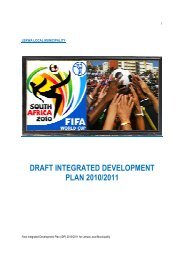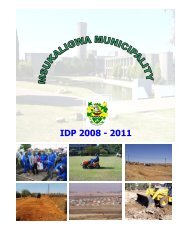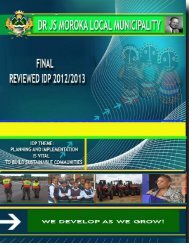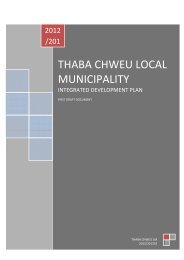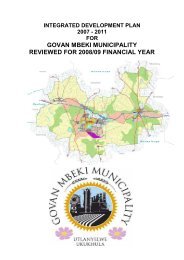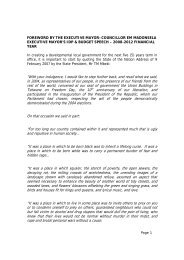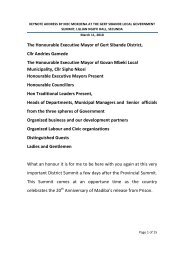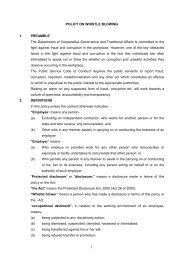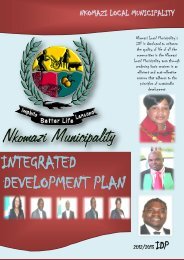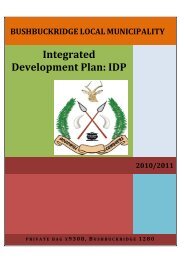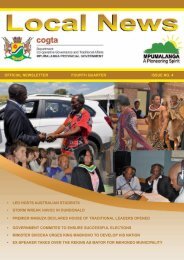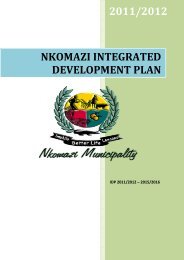Lekwa Local Municipality 2013/14 - Co-operative Governance and ...
Lekwa Local Municipality 2013/14 - Co-operative Governance and ...
Lekwa Local Municipality 2013/14 - Co-operative Governance and ...
You also want an ePaper? Increase the reach of your titles
YUMPU automatically turns print PDFs into web optimized ePapers that Google loves.
“To be the leading, people centered municipality excelling in economic growth, development <strong>and</strong> governance”3. Improving <strong>Local</strong> infrastructureOur efforts investment should be in economic infrastructure crowds in private investment. Private investment is a function of current <strong>and</strong>projected growth <strong>and</strong> profitability. Importantly, it is also a function of mutual trust <strong>and</strong> confidence in local economic development policies.In recent years, the municipality has favoured consumption over investment. The government's 2011 Medium Term Budget PolicyStatement acknowledges this <strong>and</strong> announces a shift in the composition of expenditure towards infrastructure investment <strong>and</strong> maintenance,which is absolutely necessary.4. An inclusive <strong>and</strong> integrated local rural economyThe economic <strong>and</strong> social legacy of colonialism <strong>and</strong> apartheid mean <strong>Lekwa</strong>'s rural areas are characterized by unusually high levels of poverty<strong>and</strong> joblessness, with very limited employment in agriculture. The apartheid system forced much of the <strong>Lekwa</strong> population into ruralreserves. The result was an advanced <strong>and</strong> diversified commercial farming sector relying on poorly paid farm labour, <strong>and</strong> impoverished,densely populated Sakhile communities with limited economic opportunities <strong>and</strong> minimal government services.5. Reversing the spatial effects of apartheidSettlement patterns in lekwa should meet the needs <strong>and</strong> preferences of Greater lekwa population, taking into account broader social,environmental <strong>and</strong> economic interests. Travel distances need to be shorter. This means ensuring that a larger proportion of wo rkers livecloser to their places of work in St<strong>and</strong>erton CBD, <strong>and</strong> that public transport is safe, reliable, affordable <strong>and</strong> energy efficient. It meansbuilding denser <strong>and</strong> more live able communities like the new Selection Part called St<strong>and</strong>erton Ext 8. In rural areas, settlement patternsmust balance the social, cultural <strong>and</strong> agricultural needs of families with the need to provide cost-effective services to households.6. Improving the quality of education, training <strong>and</strong> innovationBy 2030, <strong>Lekwa</strong> needs an education system with the following attributes:oooooHigh-quality early childhood education, with access rates exceeding 90 per cent.Quality school education, with globally competitive literacy <strong>and</strong> numeracy st<strong>and</strong>ards.Further <strong>and</strong> higher education <strong>and</strong> training that enables people to fulfil their potential.An exp<strong>and</strong>ing higher education sector that is able to contribute towards rising incomes, higher productivity <strong>and</strong> theshift to a more knowledge-intensive local economy.A wider system of innovation that links key public institutions (FET’s, universities <strong>and</strong> Agricultural councils) withareas of the economy consistent with our economic priorities.7. Building safer communitiesBy 2030, people living in <strong>Lekwa</strong> should feel safe <strong>and</strong> have no fear of crime. Women <strong>and</strong> children <strong>and</strong> all vulnerable groups should feelprotected. They should have confidence in the criminal justice system to effectively apprehend <strong>and</strong> prosecute criminals who vi olateindividual <strong>and</strong> community safety. The South African Police Service <strong>and</strong> <strong>Lekwa</strong> Traffic police should be a professional institution staffed byskilled, disciplined, ethical individuals who value their work <strong>and</strong> serve the communities at large.8. Fighting corruptionFight against corruption in the municipality has to be fought on three fronts: deterrence, prevention <strong>and</strong> education. Deterrence helpspeople underst<strong>and</strong> that they are likely to get caught <strong>and</strong> punished. Prevention is about systems (information, audit <strong>and</strong> so on) that make ithard to engage in corrupt acts. The social dimensions of corruption can only be tackled by focusing on values, through education. <strong>Lekwa</strong>municipality has some, but not all, of these elements in place. The municipality’s procurement policies blur the line in matters ofcorruption. Multiple <strong>and</strong> sometimes contradictory objectives lead to poor value for money <strong>and</strong> make corruption easier.The key ingredients for success are: The active efforts of all <strong>Lekwa</strong> people Growth, investment <strong>and</strong> employment Rising st<strong>and</strong>ards of education <strong>and</strong> a healthy population An effective <strong>and</strong> capable <strong>Lekwa</strong> municipality10 | P a g e - D r a f t i n t e g r a t e d D e v e l o p m e n t P l a n 2 0 1 3 / 2 0 1 4



